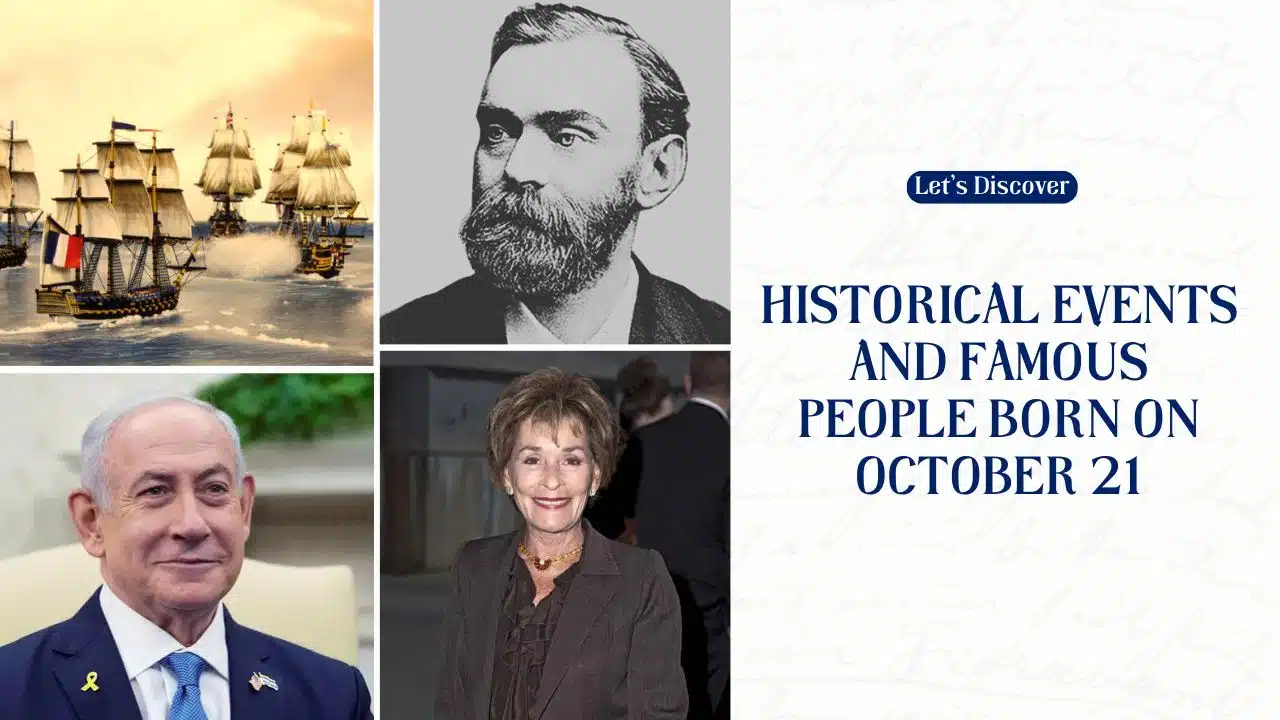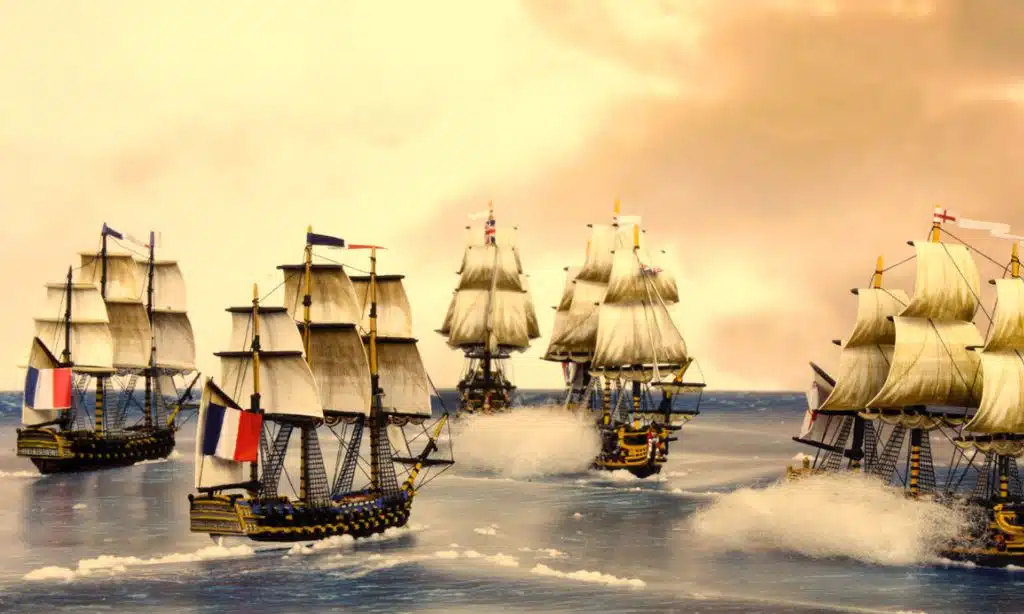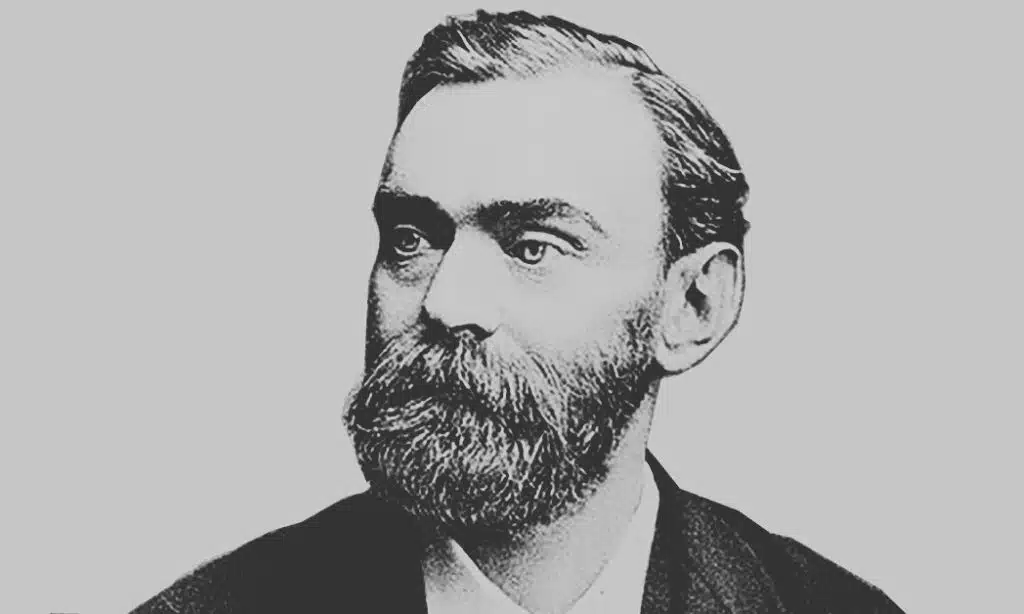October 21 is a day that has seen many important events in history. It’s also the birthday of some very interesting people. In this article, we’ll learn about big things that happened on this day and about people who were born on October 21. From explorers and battles to disasters and saints, this day has many stories to tell.
Historical Events of October 21
1520: Magellan Transits the Magellan Strait
On October 21, 1520, a explorer named Ferdinand Magellan did something very important. He and his ships sailed through a narrow passage of water between South America and an island. This passage is now called the Magellan Strait.
Magellan was trying to find a way to sail from the Atlantic Ocean to the Pacific Ocean. Finding this strait was a big deal because it meant ships could sail around South America instead of going all the way around Africa.
This discovery changed how people explored the world. It made it easier for European countries to trade with Asia and to explore the Pacific Ocean. The Magellan Strait is still an important route for ships today.
1805: Battle of Trafalgar
On October 21, 1805, a big sea battle happened near Spain. It was called the Battle of Trafalgar. The British navy, led by Admiral Horatio Nelson, fought against the combined navies of France and Spain.
This battle was part of a long war between Britain and France. Nelson used clever tricks to beat the bigger French and Spanish fleet. The British won the battle, but Nelson was shot and died.
The Battle of Trafalgar was very important. It stopped Napoleon, the leader of France, from invading Britain. It also made Britain the strongest navy in the world for many years. Nelson became a big hero in Britain because of this battle.
1937: End of Asturias Offensive
On October 21, 1937, something important happened in the Spanish Civil War. The troops of Francisco Franco, who would later become the leader of Spain, took control of a city called Gijón. This ended the fighting in a part of Spain called Asturias.
The Spanish Civil War was a big fight between different groups in Spain. Franco’s group, called the Nationalists, were fighting against the government, called the Republicans. Taking Asturias was a big win for Franco.
This event was important because it helped Franco’s side win the war. After this, Franco ruled Spain for many years. It changed the history of Spain for a long time.
1966: The Tragedy of Aberfan
On October 21, 1966, a terrible accident happened in a place called Aberfan in Wales. A big pile of waste from a coal mine slid down a hill and buried a school. 116 children and 28 adults died.
The accident happened because the waste pile was put on top of underground springs. When it rained a lot, the pile became unstable and slid down. People in the town had warned about the danger, but nothing was done.
This tragedy shocked people all over the world. It led to new rules about how to handle waste from coal mines. It also made people think more about safety in mining towns. The disaster is still remembered in Wales today.
2012: Canonization of Kateri Tekakwitha
On October 21, 2012, a Native American woman named Kateri Tekakwitha became a saint in the Catholic Church. This means the Church officially said she was a very holy person.
Kateri Tekakwitha lived in the 1600s. She was from the Mohawk tribe and became a Christian. She is known for her strong faith and for helping sick people. She died when she was only 24 years old.
Kateri becoming a saint was very important for Native American Catholics. She was the first Native American to become a saint. This showed that the Catholic Church respected Native American culture and faith.
Famous Birthdays on October 21
Hongwu (1328-1398)
Hongwu was born on October 21, 1328. He became the first emperor of China’s Ming Dynasty.
Hongwu was born into a poor family, but he joined a group that fought against the rulers of China. He became the leader of this group and eventually took control of all of China. He started the Ming Dynasty in 1368.
As emperor, Hongwu made many changes to how China was run. He built a new capital city and made new laws. The Ming Dynasty that he started ruled China for almost 300 years.
Here’s a brief biography of Hongwu:
| Fact | Information |
|---|---|
| Born | October 21, 1328 |
| Birthplace | Haozhou, China |
| Died | June 24, 1398 |
| Known for | First Emperor of Ming Dynasty |
| Reign | 1368-1398 |
| Other name | Zhu Yuanzhang |
Samuel Taylor Coleridge (1772-1834)
Samuel Taylor Coleridge was born on October 21, 1772. He was an English poet who wrote many famous poems.
Coleridge is known for writing poems that use a lot of imagination. His most famous poem is called “The Rime of the Ancient Mariner.” It’s a long poem about a sailor who has bad luck after killing a bird.
Coleridge was friends with another famous poet named William Wordsworth. Together, they helped start a new style of poetry called Romanticism. This style focused on nature and emotions.
Here’s a brief biography of Samuel Taylor Coleridge:
| Fact | Information |
|---|---|
| Born | October 21, 1772 |
| Birthplace | Ottery St Mary, England |
| Died | July 25, 1834 |
| Known for | Romantic poet |
| Famous works | “The Rime of the Ancient Mariner,” “Kubla Khan” |
| Literary movement | Romanticism |
Alfred Nobel (1833-1896)
Alfred Nobel was born on October 21, 1833. He was a Swedish scientist who invented dynamite and started the Nobel Prizes.
Nobel was an inventor who made many things, but his most famous invention was dynamite. Dynamite was safer to use than other explosives, but it could also be used to hurt people. This made Nobel feel bad.
To make up for this, Nobel left money in his will to create prizes for people who do good things for the world. These are called the Nobel Prizes. They are given every year for things like science, literature, and peace.
Here’s a brief biography of Alfred Nobel:
| Fact | Information |
|---|---|
| Born | October 21, 1833 |
| Birthplace | Stockholm, Sweden |
| Died | December 10, 1896 |
| Known for | Inventor of dynamite, founder of Nobel Prizes |
| Inventions | Dynamite, blasting gelatin |
| Legacy | Nobel Prizes |
Judith Sheindlin (born 1942)
Judith Sheindlin was born on October 21, 1942. She is better known as Judge Judy, a famous TV judge.
Sheindlin was a real judge in New York City for many years. In 1996, she started a TV show called “Judge Judy” where she solved real cases on TV. The show was very popular and ran for 25 years.
Judge Judy is known for being tough and saying exactly what she thinks. Her show has made her one of the highest-paid people on TV. She has helped make courtroom TV shows very popular.
Here’s a brief biography of Judith Sheindlin:
| Fact | Information |
|---|---|
| Born | October 21, 1942 |
| Birthplace | Brooklyn, New York, USA |
| Known for | TV judge on “Judge Judy” |
| Career start | Family Court Judge in New York |
| TV show | “Judge Judy” (1996-2021) |
| New show | “Judy Justice” (2021-present) |
Benjamin Netanyahu (born 1949)
Benjamin Netanyahu was born on October 21, 1949. He has been the Prime Minister of Israel several times.
Netanyahu first became Prime Minister in 1996. He has been Prime Minister again from 2009 to 2021, and then again from 2022. This makes him the longest-serving Prime Minister in Israel’s history.
As Prime Minister, Netanyahu has dealt with many difficult issues. He has focused on Israel’s security and economy. Some people like what he has done, while others disagree with him.
Here’s a brief biography of Benjamin Netanyahu:
| Fact | Information |
|---|---|
| Born | October 21, 1949 |
| Birthplace | Tel Aviv, Israel |
| Known for | Prime Minister of Israel |
| Political party | Likud |
| First term as PM | 1996-1999 |
| Other terms | 2009-2021, 2022-present |
Takeaway
October 21 has been a day of big events and important births throughout history. We’ve seen how it was a day when explorers made discoveries, battles were fought, and tragedies happened. We’ve also learned about some very different people who were born on this day – from emperors and poets to inventors and leaders.
Each of these events and people has left a mark on our world. From Magellan’s discovery that changed exploration to Nobel’s prizes that reward great achievements, from Coleridge’s poems that still inspire us to Netanyahu’s leadership that shapes modern Israel, October 21 has given us a lot to remember and think about.
Learning about history helps us understand our world better. It shows us how things have changed over time and how the actions of people in the past still affect us today. So next time October 21 comes around, remember all these interesting events and people!
References:
- Bergreen, L. (2003). Over the Edge of the World: Magellan’s Terrifying Circumnavigation of the Globe. William Morrow.
- Adkin, M. (2004). The Trafalgar Companion. Aurum Press.
- Beevor, A. (2006). The Battle for Spain: The Spanish Civil War 1936-1939. Weidenfeld & Nicolson.
- McLean, I., & Johnes, M. (2000). Aberfan: Government and Disasters. Welsh Academic Press.
- Greer, A. (2005). Mohawk Saint: Catherine Tekakwitha and the Jesuits. Oxford University Press.
- Dreyer, E. L. (1982). Early Ming China: A Political History. Stanford University Press.
- Holmes, R. (1989). Coleridge: Early Visions, 1772-1804. Hodder & Stoughton.
- Fant, K. (1991). Alfred Nobel: A Biography. Arcade Publishing.
- Sheindlin, J. (1996). Don’t Pee on My Leg and Tell Me It’s Raining. HarperCollins.
- Pfeffer, A. (2018). Bibi: The Turbulent Life and Times of Benjamin Netanyahu. Basic Books.






































